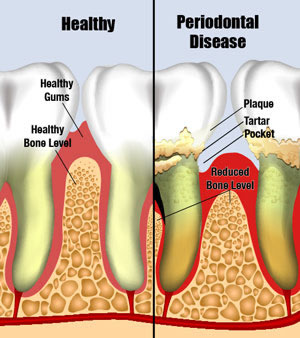Day or night for
24/7 access
7:30 AM to 4:30 PM
Monday through Friday
The word "periodontal" literally means "around the tooth". Periodontal disease (also known as "gum disease", "pyorrhea" or "periodontal infection") is an ongoing bacterial infection in the gums and bone around your teeth. This infection leads to an inflammation under the gums, and if not treated, this inflammation can destroy the bone around your teeth, resulting in tooth loss. 75% of all adult tooth loss is due to periodontal infection.
More importantly, research has linked periodontal infection to several serious medical problems, including heart disease, diabetes and stroke. As ongoing research continues to define how periodontal disease is associated with these and other health problems, your oral health maintenance is essential. Periodontal health is a key component to keeping a healthy body.
What is an "Ongoing Infection"?
 Have you ever gotten a sliver of wood caught under the skin of your hand? Because the wound is open to bacteria, the site may become infected and so appear red and inflamed. In time, your immune system fights off the bacteria and your hand heals.
Have you ever gotten a sliver of wood caught under the skin of your hand? Because the wound is open to bacteria, the site may become infected and so appear red and inflamed. In time, your immune system fights off the bacteria and your hand heals.
During an ongoing infection , however, your immune system is unable to conquer the bacteria on its own and the pain and redness continue to worsen.
Periodontal disease is an ongoing infection in the pockets around your teeth. You cannot fight off the infection alone, but with periodontal therapy, we are able to remove debris and bacteria from the site, allowing the gum to heal just as your hand did.
What Can Cause a "Burst" of Infection Activity?
People with periodontal disease have low resistance to periodontal bacteria. This causes an ongoing gum infection that can grow in "bursts" of activity. Each time it grows, more support for your teeth is lost. Some factors that can cause a "burst" of activity are:
- Poor oral hygiene
- Dental plaque
- Smoking
- Genetic factors
- Stress or tension
- Diet
- Age
- Illness
Getting Periodontal Infection Treated Right Away
When signs of infection are present, when your infection has a burst of activity, or when there are signs that this is about to occur, your general dentist may recommend you see a periodontist.
Symptoms of Periodontal Infection
Periodontal infection is usually painless until it reaches an advanced stage. That's why it is sometimes referred to as a "silent" infection, similar to high blood pressure and heart disease. However, there are some symptoms which can indicate the presence of periodontal infection.
These include:
- Red or swollen gums
- Bleeding when brushing (pink toothbrush), or at other times
- Aching, itchy, sore or tender gums
- Receding gums (teeth beginning to look longer)
- Pus between your teeth and gums when you press down on the gums
- Bad breath
- Any change in the way your teeth fit together when you bite
- Any change in the fit of partial dentures
- Loose, separating or protruding teeth
- Spaces between teeth
If you notice any of the above warning signs of periodontal infection, please contact your general dentist and ask for a periodontal evaluation.
Important Note: Your gums can look and feel quite normal and yet deep pockets of periodontal infection can still be present. To be certain about any periodontal disease, ask your dentist or periodontist to examine your gums for signs of infection.
Who is a Periodontist?
A periodontist is a dentist who specializes in the prevention, diagnosis and treatment of periodontal disease. We have also taken advanced training in the placement of dental implants. Periodontists receive extensive training in these areas, including 2 to 3 additional years of education beyond dental school. Periodontics is one of the 8 specialties recognized by the American Dental Association.
Periodontists also provide other treatments, such as crown lengthening and bone regeneration. We also work with the gingival tissues, sometimes performing "periodontal plastic surgery" to help make smiles more esthetic, or performing frenectomies for those patients in orthodontics. And sometimes we may be called on to consult about oral infections or suspicious changes in the oral tissues. (Please see About the Other Things We Do for more information.) Perhaps what is more important for you to know is that each year we pursue continuing education in all facets of our practice to both learn new techniques and to make sure our skills and knowledge levels are at the highest level.